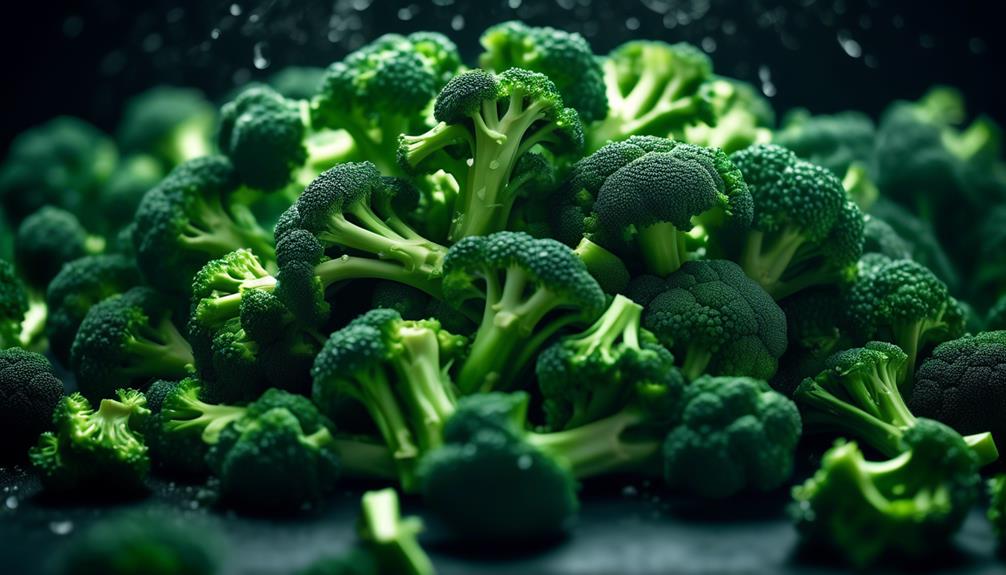Looking to maintain a low-carb diet while still getting your daily dose of fiber? Look no further than these top high-fiber, low-carb vegetables for your keto journey.
- Broccoli, with its crisp texture and vibrant green color, may surprise you with its surprisingly low carbohydrate content.
- Spinach, a leafy superfood packed with nutrients, offers a satisfying crunch and minimal carbs.
- Cauliflower, a versatile vegetable that can be transformed into rice, pizza crust, or even mashed 'potatoes,' is a low-carb dieter's dream.
- Zucchini, with its mild flavor and tender flesh, provides a great source of fiber without weighing you down.
- Kale, a nutrient powerhouse, adds a hearty, earthy element to any dish while keeping your carb count in check.
- And finally, bell peppers, with their vibrant colors and sweet crunch, are not only low in carbs but also rich in antioxidants.
Stay tuned as we dive deeper into the nutritional benefits and delicious ways to incorporate these top high-fiber, low-carb vegetables into your keto lifestyle.
Broccoli

Are you wondering how broccoli can fit into your high-fiber low-carb keto diet? Look no further, as broccoli is a fantastic addition to your keto-friendly meal plan. Not only is it low in carbohydrates, but it's also packed with essential nutrients that can support your overall health.
Broccoli is a nutritional powerhouse, providing an abundance of vitamins, minerals, and antioxidants. It's an excellent source of fiber, which is essential for maintaining a healthy digestive system and promoting feelings of fullness. Additionally, broccoli is rich in vitamin C, vitamin K, and folate, which are all vital for immune function, bone health, and cell growth.
Incorporating broccoli into your keto diet is incredibly versatile. You can enjoy it steamed, roasted, sautéed, or even raw in salads. One popular recipe is roasted broccoli with parmesan cheese. Simply toss the broccoli florets in olive oil, sprinkle with grated parmesan, and roast in the oven until tender and slightly crispy.
Another delicious option is broccoli stir-fry. Sauté broccoli florets with other low-carb vegetables like bell peppers, zucchini, and mushrooms. Add some protein, such as chicken or tofu, and season with soy sauce, garlic, and ginger for a flavorful and satisfying meal.
Spinach
Spinach isn't only delicious, but it also offers numerous health benefits. Packed with essential nutrients like vitamins A, C, and K, as well as iron and calcium, spinach can support your overall well-being.
Incorporating spinach into your keto diet is easy, as it can be enjoyed in a variety of ways, such as sautéed, steamed, or added to salads and smoothies. With its versatility and nutritional value, spinach is a great addition to your low-carb, high-fiber vegetable options on the keto diet.
Health Benefits of Spinach
With its abundance of nutrients and numerous health benefits, spinach has become a popular choice among health-conscious individuals following a low-carb, high-fiber ketogenic diet. Here are some of the benefits of incorporating spinach into a balanced diet:
- Weight loss: Spinach is low in calories and high in fiber, making it an excellent choice for weight loss. The high fiber content helps you feel full for longer and can prevent overeating.
- Nutrient-rich: Spinach is packed with essential vitamins and minerals like vitamin A, C, K, and folate. These nutrients are important for overall health and can support a strong immune system.
- Heart health: Spinach is a good source of potassium and magnesium, which are known to support heart health. These minerals can help regulate blood pressure and reduce the risk of cardiovascular diseases.
- Antioxidant properties: Spinach contains antioxidants like lutein and zeaxanthin, which can protect the eyes from damage caused by free radicals and reduce the risk of age-related macular degeneration.
Incorporating spinach into your diet can provide various health benefits, including weight loss support, essential nutrients, improved heart health, and eye protection. Consider adding this nutrient-rich vegetable to your meals for a delicious and nutritious boost.
Cooking With Spinach
Incorporating spinach into your meals can add a nutritious and flavorful element to your cooking repertoire.
When it comes to cooking techniques for spinach, there are several options to choose from.
One popular method is sautéing, where you heat a little oil or butter in a pan and cook the spinach until it wilts. This technique helps retain the vibrant green color and the nutrients of the spinach.
Another technique is steaming, which involves placing the spinach in a steamer basket and cooking it until it becomes tender. Steaming is a great option for preserving the nutrients in spinach.
Additionally, spinach can also be used in various recipes such as salads, soups, smoothies, and stir-fries. Its versatility makes it a fantastic ingredient to experiment with in the kitchen.
Spinach in Keto Recipes
To make your keto recipes more nutritious and flavorful, consider incorporating spinach as a versatile ingredient. Spinach isn't only low in carbs but also packed with essential vitamins and minerals. Here are four ways you can use spinach in your keto recipes:
- Spinach Smoothie: Blend spinach with your favorite low-carb fruits and a keto-friendly liquid like almond milk or coconut water for a refreshing and nutrient-rich smoothie.
- Spinach Salad: Create a delicious and satisfying salad by combining spinach with other low-carb vegetables like cucumbers, cherry tomatoes, and avocado. Add some protein like grilled chicken or salmon and top it off with a keto-friendly dressing.
- Spinach Stuffed Chicken: Make a flavorful and low-carb meal by stuffing chicken breasts with a mixture of spinach, cream cheese, and herbs. Bake or grill until the chicken is cooked through and enjoy a delicious, protein-packed dish.
- Spinach and Cheese Omelet: Start your day right with a spinach and cheese omelet. Whisk together eggs, spinach, and your favorite keto-friendly cheese. Cook it in a non-stick skillet until the eggs are set and the cheese is melted. Serve with a side of avocado for a complete keto breakfast.
Incorporating spinach into your keto recipes is a great way to add nutrients and flavor while keeping your carb intake low. Whether you choose to enjoy it in a smoothie, salad, stuffed chicken, or omelet, spinach is a versatile ingredient that can elevate your keto dishes.
Cauliflower
Cauliflower, a versatile and nutritious vegetable, is an excellent choice for those following a high-fiber low-carb keto diet. With its mild flavor and ability to mimic popular carb-heavy dishes, cauliflower has become a staple in many low-carb recipes.
One of the main reasons cauliflower is popular among keto dieters is its low carbohydrate content. A cup of cauliflower contains only about 5 grams of carbs, making it a suitable option for those on a low-carb diet. Additionally, cauliflower is rich in dietary fiber, with about 2 grams per cup. This high fiber content can help promote feelings of fullness and aid in digestion.
In addition to its low-carb and high-fiber content, cauliflower also offers various health benefits. It's an excellent source of vitamins and minerals, including vitamin C, vitamin K, folate, and potassium. These nutrients play a crucial role in maintaining a healthy immune system, promoting bone health, and supporting heart health.
Furthermore, cauliflower is incredibly versatile and can be used in a wide array of recipes. It can be riced, mashed, roasted, or even used as a pizza crust alternative. Whether you're craving a warm bowl of cauliflower soup or a delicious cauliflower rice stir-fry, the possibilities are endless with this nutritious vegetable.
To incorporate more cauliflower into your keto diet, try experimenting with different cauliflower recipes. From cauliflower 'mac' and cheese to cauliflower crust pizza, there are plenty of delicious options to satisfy your cravings while staying on track with your low-carb lifestyle.
Zucchini

Now let's turn our attention to zucchini, another versatile and nutrient-rich vegetable that can be a valuable addition to your high-fiber low-carb keto diet.
Zucchini isn't only delicious but also packed with health benefits. Here are four reasons why you should consider incorporating zucchini into your meals:
- Low in carbs, high in fiber: Zucchini is a great choice for keto enthusiasts because it's low in carbs and high in fiber. This means it can help you feel fuller for longer while keeping your carb intake in check.
- Rich in vitamins and minerals: Zucchini is a good source of vitamins A and C, as well as potassium and manganese. These nutrients play important roles in maintaining overall health and supporting various bodily functions.
- Promotes healthy digestion: The high fiber content in zucchini can help promote healthy digestion by adding bulk to your stool and preventing constipation. It also supports the growth of beneficial gut bacteria.
- Versatile and delicious: Zucchini is incredibly versatile and can be used in a variety of dishes. From zucchini noodles to zucchini bread, the possibilities are endless. There are numerous zucchini recipes available that can satisfy your taste buds while keeping you on track with your keto diet.
Incorporating zucchini into your high-fiber low-carb keto diet can provide you with a range of health benefits while adding delicious variety to your meals. So go ahead and explore the world of zucchini recipes to enjoy all that this vegetable has to offer.
Kale
Kale, a nutrient-dense leafy green vegetable, offers a multitude of health benefits and is an excellent addition to a high-fiber low-carb keto diet. Packed with fiber and low in carbohydrates, kale is a versatile ingredient that can be incorporated into a variety of delicious keto-friendly recipes.
One of the key health benefits of kale is its high fiber content. Consuming adequate amounts of fiber is essential for maintaining a healthy digestive system and promoting regular bowel movements. Additionally, fiber helps in managing blood sugar levels by slowing down the absorption of glucose into the bloodstream, making it particularly beneficial for individuals following a low-carb keto diet.
Kale is also rich in vitamins and minerals, including vitamins A, C, and K, as well as calcium, potassium, and magnesium. These nutrients play a crucial role in supporting overall health and well-being. Vitamin A is important for maintaining healthy vision, while vitamin C boosts the immune system. Vitamin K is essential for blood clotting, and calcium, potassium, and magnesium are vital for maintaining strong bones and a healthy heart.
To incorporate kale into your keto diet, explore a variety of kale recipes like kale chips, sautéed kale, or kale salads. These recipes offer a delicious and nutritious way to enjoy this leafy green vegetable while sticking to your low-carb keto goals.
Bell Peppers

When it comes to bell peppers, you'll be pleased to know that they offer a range of nutritional benefits that make them a great addition to your low-carb keto diet.
These colorful vegetables are packed with essential vitamins and minerals, including vitamin C, vitamin A, and potassium.
Not only are they low in carbs, but they also contain a good amount of fiber, which can help support healthy digestion.
Nutritional Benefits
Bell peppers offer a wide range of nutritional benefits, making them an excellent addition to a high-fiber, low-carb keto diet. Here are four reasons why bell peppers are of dietary importance and can aid in weight management:
- Low in calories: Bell peppers are low in calories, making them a great choice for those looking to manage their weight. A medium-sized bell pepper contains only about 30 calories.
- High in fiber: Bell peppers are rich in dietary fiber, which can help keep you feeling full and satisfied. This can aid in weight management by reducing the desire to overeat.
- Packed with vitamins: Bell peppers are loaded with essential vitamins such as vitamin C, vitamin A, and vitamin B6. These vitamins play a crucial role in supporting overall health and immune function.
- Antioxidant power: Bell peppers are rich in antioxidants, which can help protect your cells from damage caused by free radicals. This can have a positive impact on weight management and overall well-being.
Incorporating bell peppers into your keto diet can provide numerous nutritional benefits while supporting your weight management goals.
Cooking and Preparation
To enhance the flavor and texture of bell peppers while maintaining their nutritional value, there are various cooking and preparation methods you can explore.
Bell peppers are versatile vegetables that can be enjoyed raw or cooked in a variety of dishes.
One popular cooking technique is roasting, which brings out their natural sweetness and adds a smoky flavor. To roast bell peppers, simply place them under a broiler or on a grill until the skin is charred and blistered. Afterward, let them cool, peel off the skin, and remove the seeds before using them in salads, sandwiches, or stir-fries.
Another option is to sauté bell peppers with other vegetables or protein sources, such as onions, mushrooms, or chicken, in a skillet with a bit of oil. This method allows the peppers to retain their crunch while adding depth of flavor.
Additionally, bell peppers can be stuffed with a variety of fillings, such as ground meat, cheese, or grains, and then baked until tender.
Remember to experiment with different cooking techniques to find your favorite way of enjoying bell peppers in your keto meal planning.
Conclusion
In conclusion, incorporating high-fiber, low-carb vegetables into a keto diet can provide numerous health benefits.
Broccoli, spinach, cauliflower, zucchini, kale, and bell peppers are excellent choices to fuel your body with essential nutrients while keeping your carb intake in check.
These vegetables not only promote digestive health and blood sugar control but also contribute to weight management.
By including these veggies in your meals, you can maintain a balanced, research-driven keto lifestyle that supports your overall well-being.







